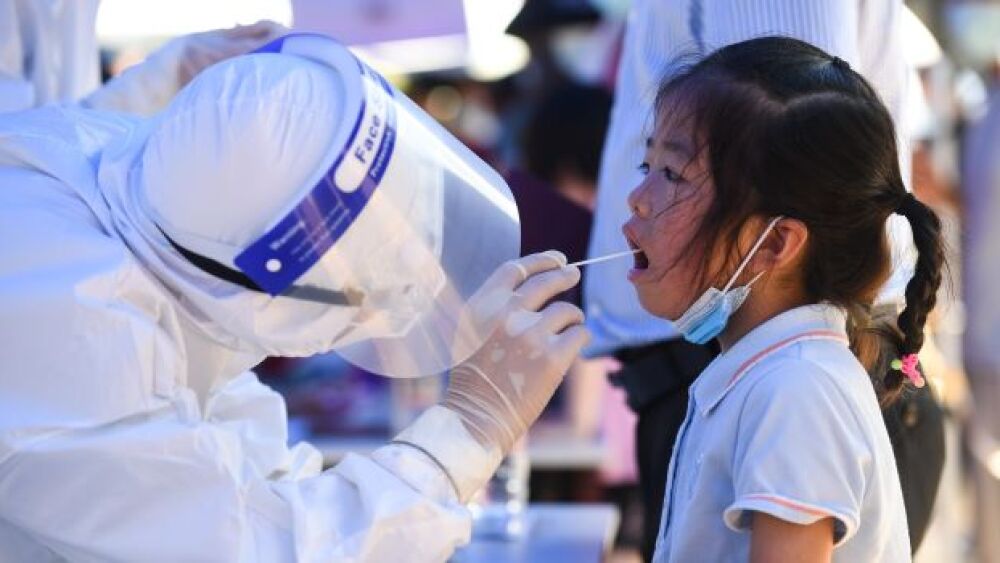Dr. Anthony Fauci expects the FDA will authorize the Pfizer-BioNTech vaccine for children under the age of five in the next month.
Ji Chunpeng/Xinhua via Getty Images
COVID-19 vaccines are still not authorized for the youngest in our population, kids five and younger, but emergency use authorization for the Pfizer-BioNTech vaccine is expected soon. For that and related stories, continue reading.
Pfizer-BioNTech Vaccine for 5-Year-Olds & Under Coming Soon
Dr. Anthony Fauci, director of the National Institute of Allergy and Infectious Diseases and White House chief medical advisor, said they expect the U.S. Food and Drug Administration will authorize the Pfizer-BioNTech vaccine for children under the age of five in the next month. In the Pfizer clinical trials, two doses didn’t create an adequate immune response in children two to four years of age, so Fauci suspects it will likely be authorized for three doses.
“My hope is that it’s going to be within the next month or so and not much later than that, but I can’t guarantee that,” Dr. Fauci said in an interview with Blue Star Families, a nonprofit that supports military families.
Both Vaccination and Previous Infection Offers Strong Protection Against Delta
New data out of the Centers for Disease Control and Prevention and public health organizations in California and New York suggests that vaccination and previous infection provided strong protection against infection and hospitalization during the Delta wave. And surprisingly, the case and hospitalization rates were lower in people who had recovered from natural infection than people who had been vaccinated. The data is not without its problems. It was built on information through November 2021, before booster shots were common. And it did not take into account the Omicron variant. And, of course, the vaccines don’t come with anywhere near the risk of death and long-term health problems that COVID-19 does.
“We know that vaccination remains the safest strategy for protecting against COVID-19,” said Benjamin Silk, Ph.D., a CDC epidemiologist.
How Long Do Boosters Offer Protection?
U.K. researchers have made estimates for how long a third shot of the Pfizer-BioNTech vaccine will last, although the results are varied. They find that protection against infection probably lasts less than six months, but protection against severe disease is stronger. Protection immediately after the third shot is very high but drops to about 70% after two weeks, and by three months, it reduces the risk of symptomatic infection by approximately 50%. A month later, it’s about 40%.
Immunologist Jennifer Gommerman at the University of Toronto noted, “The vaccine’s efficacy against infection relies on our level of antibodies because they are really our first line of defense against SARS-CoV-2.” It’s not unusual for antibody levels to decrease over time. But the immune system is made up of more than just antibodies, and protection against severe disease doesn’t rely only on antibodies. Gommerman added, “So with declining antibody levels, you might be vulnerable to an infection but not necessarily vulnerable to disease—that’s a different kettle of fish.”
Omicron Appears More Dangerous for Children
The risk of COVID-19 to children has been relatively low up to this point, but studies are suggesting that the Omicron variant is more dangerous for children than previous strains. This conclusion came from an analysis of hospitalization rates from one of South Africa’s largest medical insurance programs. Out of 2 million beneficiaries of the country’s Government Employees Medical Scheme, an analysis of 56,164 COVID-19-related hospitalizations found the admission rate for children four years and younger was 49% higher during the Omicron wave than during the Delta surge. It was also higher than surges caused by the Wuhan and Beta variants. Admissions were also 25% higher for children four to 18 than for the Delta wave, but lower than for Beta.
Omicron and Long COVID
With the highly infectious Omicron variant causing an enormous surge, public health officials are wondering if this will result in even more long COVID cases. So far, they don’t think so. Long COVID has more than 50 symptoms that can last for weeks or months after the initial COVID-19 infection. Most people with Omicron infections seem to have more cold-like, milder symptoms, which might be the result of more immunity from previous infections or vaccines. Although the data is still coming in, a study in the U.K. suggests that vaccinated individuals are 49% less likely to develop long COVID. Fauci noted that “long COVID can happen no matter what virus variant occurs. There’s no evidence that there’s any difference between Delta or Beta or now Omicron.”
No Evidence of Live SARS-CoV-2 in Breastmilk
A study from the University of California from 160 samples of breastmilk from 110 women with confirmed or suspected COVID-19 found no evidence that breastmilk transmits the virus to their babies. Using PCR testing, subgenomic RNA from the virus was detected in the milk of seven women, including six of 65 women with confirmed COVID-19. Subgenomic RNA is not a live (infectious) virus, although some scientists think it might suggest replicating virus. The bottom line is that they did not find evidence that breastmilk from mothers infected with COVID-19 contained infectious genetic material.
Gilead’s Remdesivir Decreases Mechanical Ventilation
Research published in the Canadian Medical Association Journal demonstrated that Gilead’s antiviral drug remdesivir decreases the use of mechanical ventilation by almost 50% for hospitalized COVID-19 patients. They randomized 1,282 patients at 52 Canadian hospitals from August 14, 2020, to April 1, 2021, to receive either remdesivir or standard of care. Patients who received remdesivir had an in-hospital mortality rate of 18.7% compared to 22.6% in the standard-of-care group and 60-day mortality was 24.8% and 28.2%, respectively. The remedesivir group had an 8% mechanical ventilation rate compared to 15% for the standard-of-care cohort.
Merck Makes Deal with Approximately 30 Generic Drugmakers for its COVID-19 Antiviral
Merck and Ridgeback Biotherapeutics, with U.N.-backed Medicines Patent Pool, signed a deal with almost 30 generic drugmakers around the world to produce Merck’s COVID-19 antiviral molnupiravir. It allows 27 generic drugmakers from India, China and countries in Africa, Asia and the Middle East to manufacture ingredients and the finished drug. The deal will allow for distribution of the pill to 105 less-developed countries, with some deliveries beginning as early as February. In the poorer countries, the course of 40 pills for five days will run about $20. In the U.S., it runs about $700. Merck, Ridgeback and Emory University will not receive royalties from the sale of the low-cost generics while the World Health Organization has COVID-19 classified as a Public Health Emergency of International Concern.
Valneva’s COVID-19 Vaccine Neutralizes Omicron
Saint Herblain, France-based Valneva announced results from an early laboratory study showing that antibodies produced by three doses of its inactivated COVID-19 vaccine candidate, VLA2001, neutralized the Omicron variant. The tests were on 30 people in the Phase I/II trial, testing an Omicron pseudovirus on sera. All 30 samples created neutralizing antibodies against the Wuhan wild-type strain and the Delta and Omicron variants.





